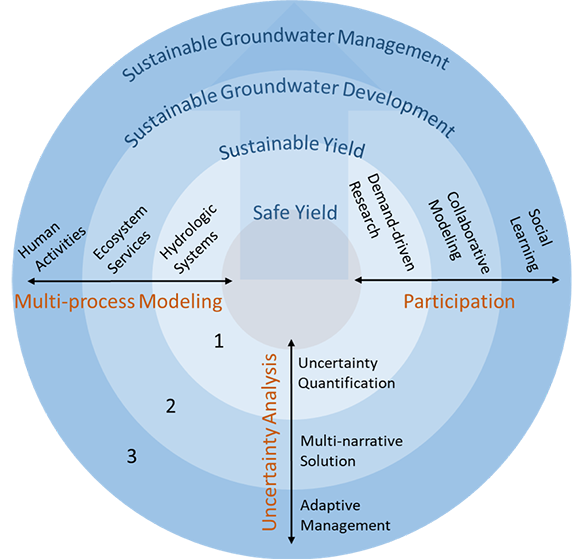
SPONSOR:
National Science Foundation – EPSCoR’s ‘Ike Wai
PROJECT PERIOD:
2017 – 2021
COLLABORATORS:
Ahmed Elshall, Aida Arik, Aly El-Kadi, Suzanne Pierce, Ye Ming, Kim Burnett, Christopher Wada, Leah Bremer, and Gregory Chun.
ABSTRACT:
This study provides a systematic review of the concept of groundwater sustainability, and situates this concept within the calls from the hydrologic literature for more participatory and integrated approaches to water security. We discuss the definition of groundwater sustainability from both a policy and scientific perspective, tracing the evolution of this concept from safe yield to sustainable groundwater management. We focus on the diversity of societal values related to groundwater sustainability, and the typology of the aquifer performance and governance factors. In addition, we systematically review the main components of an effective scientific evaluation of groundwater sustainability policy, which are multi-process modeling, uncertainty analysis, and participation. We conclude that effective groundwater sustainability policy implementation requires an iterative scientific evaluation that (1) engages stakeholders in a participatory process through collaborative modeling and social learning; (2) provides improved understanding of the coevolving scenarios between surface water-groundwater systems, ecosystems, and human activities; and (3) acknowledges and addresses uncertainty in our scientific knowledge and the diversity of societal preferences using multi-model uncertainty analysis and adaptive management.
Project Publication:
Elshall, A.S., A.D. Arik, A.I. El-Kadi, S. Pierce, S., M. Ye, K.M. Burnett, C.A. Wada, L.L. Bremer, and G. Chun. 2020. Groundwater sustainability: A review of the interactions between science and policy. Environ. Res. Lett. 15(9). DOI: 10.1088/1748-9326/ab8e8c
PRINCIPAL INVESTIGATOR
